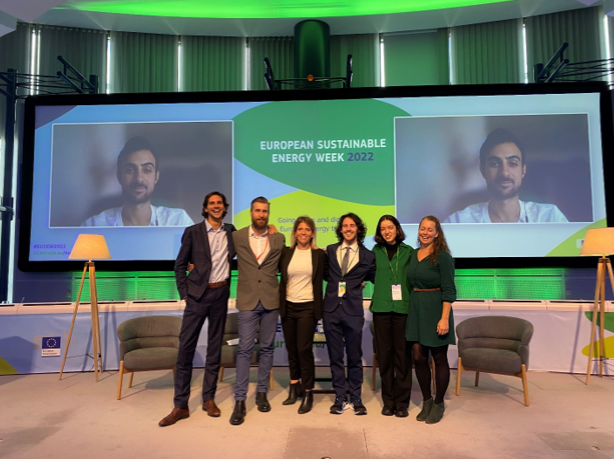
During the 4 days event, the Covenant of Mayors Europe office was present with the on-site stand welcoming participants and speakers who were interested in learning more about local actions on tackling climate change and energy transition.
On Thursday, 29 September, the CoM Europe office organised a hybrid workshop on renewable energy communities, with distinguished speakers from the Energy Communities Repository (Myriam Castanie), the Rural Energy Community Advisory Hub (Eugenia Bonifazi) and last but not least, representatives from Valencia (Arturo Zea) and from Prague Renewable Energy Community (Jaroslav Klusák). The discussion was moderated by Achille Hannoset, Policy Officer at DG ENER (European Commission).
During the introduction, the moderator gave an overview of the EU enabling framework to enhance the promotion of renewable energy communities. He explained the difference between Citizen-led energy communities and Renewable energy communities. The latter, has an important linkage to energy poverty since participation should be open for energy-poor and vulnerable households, as well as, local dimension (proximity of geographical scope).
To support the promotion of energy communities and highlight their state of the art, the European Commission created 1) Energy Communities Repository, with a dedicated website of ongoing energy communities in Europe, and 2) the Rural Energy Community Advisory Hub, to empower the development of sustainable energy projects in EU rural areas by facilitating the exchange of best practices and producing user-friendly guidance documents.
When it comes to the question of how multilevel governance could support energy communities, Myriam Castanie highlighted the role of support schemes (feed-in tariffs, green certificates), state aid guidelines and public procurement procedures (i.e. through minimum threshold participation for citizens, enabled by municipalities).
The city of Valencia showcased an example of a multi-stakeholder approach, with a strong enabling framework to support citizen participation, to set up its first successful renewable energy community project in 2019: CEL Castellar-L’Oliveral. It started from a participatory process and awareness raising for different neighbourhoods in Valencia. Although “energy communities” are not officially regulated at the national level, in 2019 there was a favourable context from the national regulatory framework allowing, for the first time, to talk about “collective self-consumption”.
Another success story at the local level was that of the Prague Renewable Energy Community, established in February 2022 and embedded in the city’s Climate Plan 2030. The project kicked off with a pilot of 50 residential buildings in 2022 and received EU funding from EIB-ELENA and the Modernization Fund.
However, despite the local efforts to develop these projects, numerous existing barriers are still preventing citizens and businesses from investing. A common challenge for both Prague and Valencia, is the lack of a national regulatory framework to support the development of renewable energy communities and to remove all the existing barriers, such as the obligation to be 500m away from the generation point, in Spain. Other barriers also included the lack of space (“roofs”) to install the projects and the time-consuming process of public procurement.
Some of the key takeaways were:
· “Renewable Energy Communities” are the ideal vehicle to bring together citizens, local authorities, and businesses to collaborate on the clean energy transition at the local level. Therefore, the role of local authorities is key to facilitating these local projects and providing legal and technical assistance to overcome the steep learning curve.
· It is important to increase awareness among citizens about RECs through local energy campaigns, especially in the current context of the energy crisis.
· An enabling legal framework, as well as financial support, is required both at the national and EU level.
Watch the recording of our session HERE at the minute 2h33!
Sonraí
- Dáta foilsithe
- 3 October 2022
